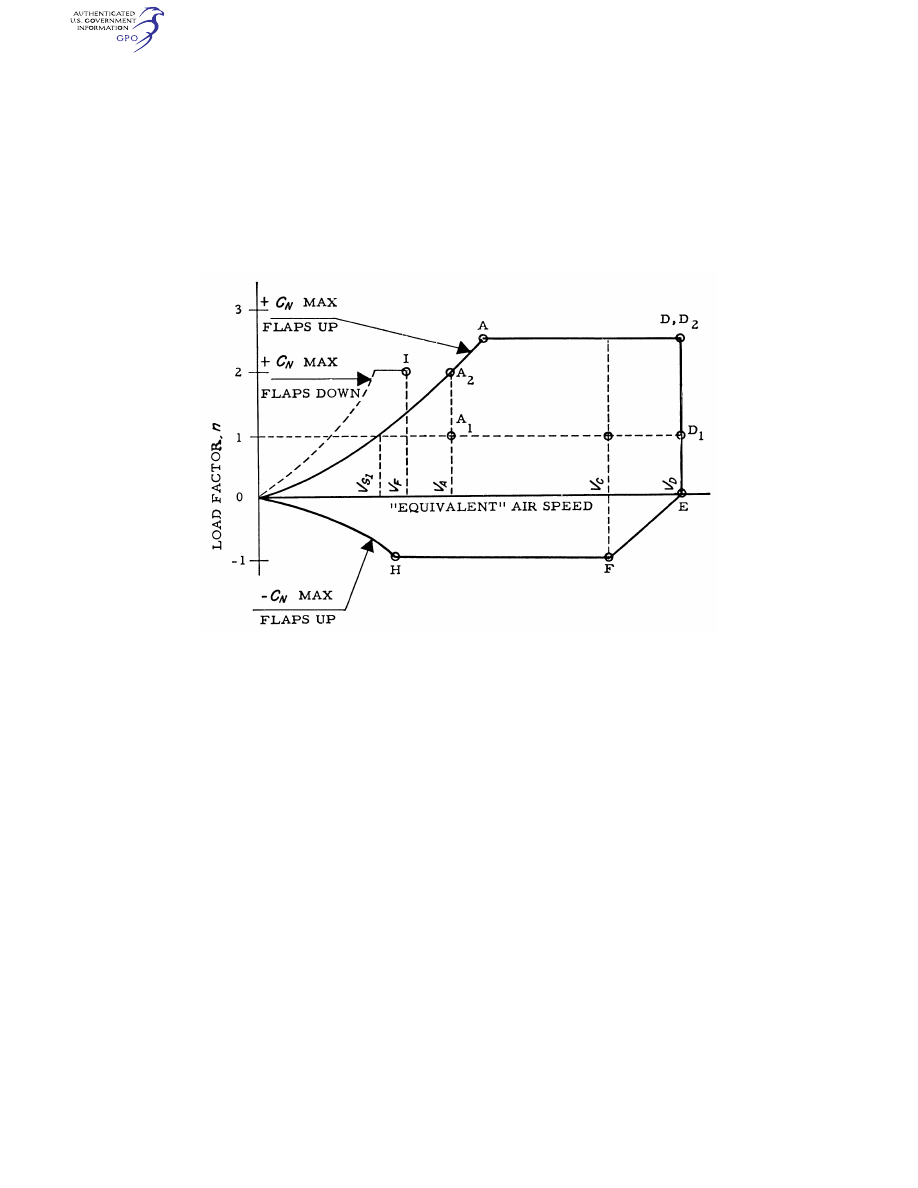
236
14 CFR Ch. I (1–1–24 Edition)
§ 25.335
[Doc. No. 5066, 29 FR 18291, Dec. 24, 1964, as amended by Amdt. 25–86, 61 FR 5220, Feb. 9, 1996]
§ 25.335
Design airspeeds.
The selected design airspeeds are
equivalent airspeeds (EAS). Estimated
values of
V
S0
and
V
S1
must be conserv-
ative.
(a)
Design cruising speed, V
C
. For
V
C,
the following apply:
(1) The minimum value of
V
C
must be
sufficiently greater than
V
B
to provide
for inadvertent speed increases likely
to occur as a result of severe atmos-
pheric turbulence.
(2) Except as provided in § 25.335(d)(2),
V
C
may not be less than V
B
+ 1.32 U
REF
(with U
REF
as specified in
§ 25.341(a)(5)(i)). However V
C
need not
exceed the maximum speed in level
flight at maximum continuous power
for the corresponding altitude.
(3) At altitudes where
V
D
is limited
by Mach number,
V
C
may be limited to
a selected Mach number.
(b)
Design dive speed, V
D
.
V
D
must be
selected so that
V
C
/
M
C
is not greater
than 0.8
V
D
/
M
D,
or so that the minimum
speed margin between
V
C
/
M
C
and
V
D
/
M
D
is the greater of the following values:
(1) From an initial condition of sta-
bilized flight at
V
C
/
M
C,
the airplane is
upset, flown for 20 seconds along a
flight path 7.5
°
below the initial path,
and then pulled up at a load factor of
1.5
g (0.5g acceleration increment). The
speed increase occurring in this maneu-
ver may be calculated if reliable or
conservative aerodynamic data is used.
Power as specified in § 25.175(b)(1)(iv) is
assumed until the pullup is initiated,
at which time power reduction and the
use of pilot controlled drag devices
may be assumed;
(2) The minimum speed margin must
be enough to provide for atmospheric
variations (such as horizontal gusts,
and penetration of jet streams and cold
fronts) and for instrument errors and
airframe production variations. These
factors may be considered on a prob-
ability basis. The margin at altitude
where M
C
is limited by compressibility
effects must not less than 0.07M unless
a lower margin is determined using a
rational analysis that includes the ef-
fects of any automatic systems. In any
VerDate Sep<11>2014
09:06 Jun 28, 2024
Jkt 262046
PO 00000
Frm 00246
Fmt 8010
Sfmt 8010
Y:\SGML\262046.XXX
262046
EC28SE91.035</GPH>
jspears on DSK121TN23PROD with CFR

237
Federal Aviation Administration, DOT
§ 25.337
case, the margin may not be reduced to
less than 0.05M.
(c)
Design maneuvering speed V
A
. For
V
A
, the following apply:
(1) V
A
may not be less than V
S1
√
n
where—
(i)
n is the limit positive maneu-
vering load factor at
V
C
; and
(ii)
V
S1
is the stalling speed with flaps
retracted.
(2)
V
A
and
V
S
must be evaluated at
the design weight and altitude under
consideration.
(3)
V
A
need not be more than
V
C
or
the speed at which the positive
C
N max
curve intersects the positive maneuver
load factor line, whichever is less.
(d)
Design speed for maximum gust in-
tensity, V
B
.
(1) V
B
may not be less than
V
K U
V a
w
S
g
ref
c
1
1 2
1
498
+
⎡
⎣
⎢
⎤
⎦
⎥
where—
V
S1
= the 1-g stalling speed based on C
NAmax
with the flaps retracted at the particular
weight under consideration;
V
c
= design cruise speed (knots equivalent
airspeed);
U
ref
= the reference gust velocity (feet per
second equivalent airspeed) from
§ 25.341(a)(5)(i);
w = average wing loading (pounds per square
foot) at the particular weight under con-
sideration.
K
w
cag
g
=
+
=
.
.
88
5 3
2
μ
μ
μ
ρ
r
= density of air (slugs/ft
3
);
c = mean geometric chord of the wing (feet);
g = acceleration due to gravity (ft/sec
2
);
a = slope of the airplane normal force coeffi-
cient curve, C
NA
per radian;
(2) At altitudes where V
C
is limited
by Mach number—
(i) V
B
may be chosen to provide an
optimum margin between low and high
speed buffet boundaries; and,
(ii) V
B
need not be greater than V
C
.
(e)
Design flap speeds, V
F
. For
V
F
, the
following apply:
(1) The design flap speed for each flap
position (established in accordance
with § 25.697(a)) must be sufficiently
greater than the operating speed rec-
ommended for the corresponding stage
of flight (including balked landings) to
allow for probable variations in control
of airspeed and for transition from one
flap position to another.
(2) If an automatic flap positioning or
load limiting device is used, the speeds
and corresponding flap positions pro-
grammed or allowed by the device may
be used.
(3)
V
F
may not be less than—
(i) 1.6
V
S1
with the flaps in takeoff po-
sition at maximum takeoff weight;
(ii) 1.8
V
S1
with the flaps in approach
position at maximum landing weight,
and
(iii) 1.8
V
S0
with the flaps in landing
position at maximum landing weight.
(f)
Design drag device speeds, V
DD
. The
selected design speed for each drag de-
vice must be sufficiently greater than
the speed recommended for the oper-
ation of the device to allow for prob-
able variations in speed control. For
drag devices intended for use in high
speed descents,
V
DD
may not be less
than
V
D
. When an automatic drag de-
vice positioning or load limiting means
is used, the speeds and corresponding
drag device positions programmed or
allowed by the automatic means must
be used for design.
[Doc. No. 5066, 29 FR 18291, Dec. 24, 1964, as
amended by Amdt. 25–23, 35 FR 5672, Apr. 8,
1970; Amdt. 25–86, 61 FR 5220, Feb. 9, 1996;
Amdt. 25–91, 62 FR 40704, July 29, 1997]
§ 25.337
Limit maneuvering load fac-
tors.
(a) Except where limited by max-
imum (static) lift coefficients, the air-
plane is assumed to be subjected to
symmetrical maneuvers resulting in
the limit maneuvering load factors pre-
scribed in this section. Pitching veloci-
ties appropriate to the corresponding
pull-up and steady turn maneuvers
must be taken into account.
(b) The positive limit maneuvering
load factor
n for any speed up to Vn
may not be less than 2.1 + 24,000/ (
W +
10,000) except that
n may not be less
than 2.5 and need not be greater than
3.8—where
W is the design maximum
takeoff weight.
(c) The negative limit maneuvering
load factor—
VerDate Sep<11>2014
09:06 Jun 28, 2024
Jkt 262046
PO 00000
Frm 00247
Fmt 8010
Sfmt 8010
Y:\SGML\262046.XXX
262046
ER09fe96.016</MATH>
ER09FE96.017</MATH>
jspears on DSK121TN23PROD with CFR

